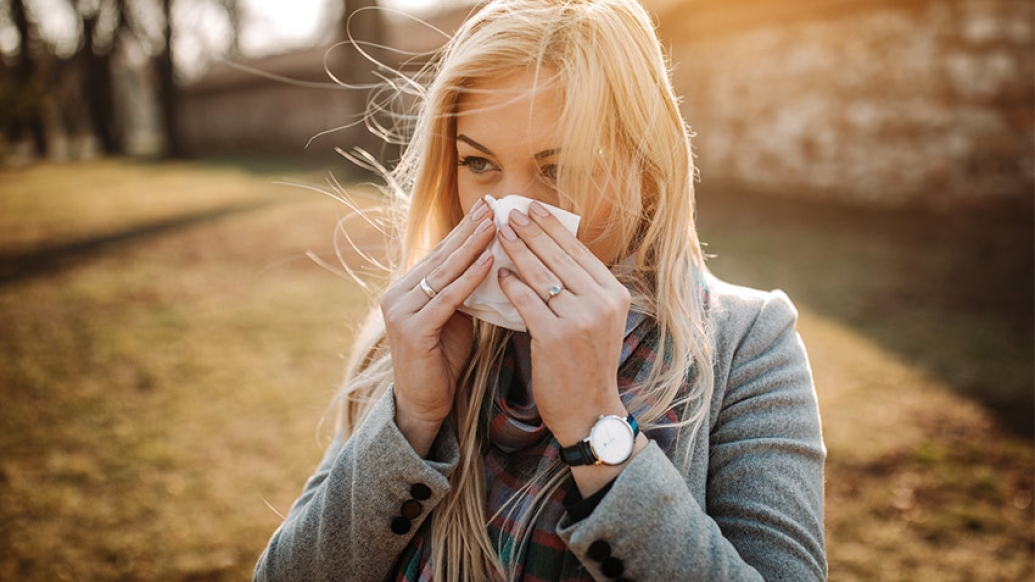The season brings with it a host of allergens that can make life miserable. Here’s how to manage, according to allergists.
2:55 PM
Author |

While it's hard not to love the cooler temperatures and vibrant colors of fall, if you suffer from allergies, you might not be so quick to welcome the season — especially if you have asthma.
This time of year is particularly difficult for those with asthma, said University of Michigan Health pulmonologist Njira Lugogo, M.D., who specializes in treating this patient population. Those with allergic asthma - the most common form of asthma - can be significantly challenged by the season and the allergens that come with it, she said.
The biggest culprit in triggering fall allergies is pollen, which is released by ragweed and can travel many miles in the wind. Another trigger is mold from decomposing fallen leaves and damp areas where water collects. These seasonal allergens can be joined by perennial indoor allergens like dust mites, which are more common when the heat is turned on, cockroach/insect droppings and animal dander, making symptoms even worse for those with asthma.
Why your immune system overreacts
Allergies and asthma are the body's response to an immune system that overreacts to a substance it mistakenly identifies as harmful or dangerous. When this happens, the body produces an inflammatory response that results in symptoms like a runny nose, sneezing, watery eyes, itching, coughing or wheezing.
"The immune system can express allergies in many different ways depending on the individual," said Lugogo. "For example, the allergic response can show up in the upper airways such as the nose, throat or eyes … it all depends on the individual's immune system."
MORE FROM MICHIGAN: Sign up for our weekly newsletter
Adding asthma to the equation often means these patients get hit harder by allergies that, in turn, can make their asthma symptoms worse.
"Allergies that cause the upper airways to become inflamed can also make it difficult to control the lower airways in the lungs of asthma sufferers, impacting their ability to breathe," Lugogo said.
Avoiding harmful allergens
U-M allergy and immunology specialist Anna Kovalszki, M.D., said many of her patients experience exacerbated symptoms in the fall. "For these patients, we recommend avoiding outdoor exercise, or even avoiding going outside altogether if symptoms are severe."
Lugogo and Kovalszki stress the importance of asthma patients maintaining their medical management strategies while also mitigating seasonal allergens. Medical management includes inhalers, steroids, antihistamines and biologics (pharmaceutical drugs that precisely target pathways causing inflammation in the lungs).
"We recommend a multi-pronged approach that includes medical management as well as looking at your environment and eliminating as many allergens as possible," Lugogo said.
Both specialists agree these four strategies are key for mitigating allergens:
-
Monitor your area's pollen and mold counts and stay inside when counts are high.
-
Wash your clothes after being outside.
-
Keep doors and windows closed to reduce the amount of pollen and mold that comes indoors.
-
Invest in an air purifier to keep the air inside your home allergen-free.
An individualist approach to allergies
Beyond these strategies, the U-M pulmonary team stresses that your doctor should take an individualist approach to understanding your particular condition before determining necessary treatment.
"Our goal is to treat individuals versus one treatment plan for all," said Lugogo. "We view the history of the patient: What are your symptoms? What's driving your asthma? For example, we know that treatments like inhaled steroids might be better for some than others. In this case, the discussion is driven by how a patient's lungs respond to inhaled steroids."
For some, subcutaneous immunotherapy might be beneficial, according to Lugogo.
"This involves giving the patient a of a low dose of what they're allergic to via injection. The goal is to de-sensitize the immune system by exposing patients to larger and larger amounts of the allergen in an attempt to change the immune system's response to a particular allergen."
Kovalszki recommends this type of immunotherapy for her patients with mild to moderate asthma conditions.
"For some patients, allergy shots may decrease the severity and amount of asthma flares." But, she cautioned, "Patients must also maintain their medical management."
Like Podcasts? Add the Michigan Medicine News Break on iTunes, Google Podcasts or anywhere you listen to podcasts.
Another form of allergen immunotherapy known as sublingual immunotherapy involves placing allergy tablets under the tongue for several minutes, then swallowing as the tablets dissolve.
"This therapy has been approved as an effective method of treating some environmental allergens, but has not been specifically tested on allergic asthma patients and is not recommended specifically for asthma," said Kovalszki. "More data is needed to understand if it will have similar positive effects on asthma as it does on nasal allergies."
Ultimately, Lugogo and Kovalszki urge their patients to limit exposure to allergens affecting their asthma.
"We encourage our patients to make environmental changes to help them tolerate any time of year and any allergy triggers," said Lugogo.

Explore a variety of healthcare news & stories by visiting the Health Lab home page for more articles.

Department of Communication at Michigan Medicine
Want top health & research news weekly? Sign up for Health Lab’s newsletters today!





